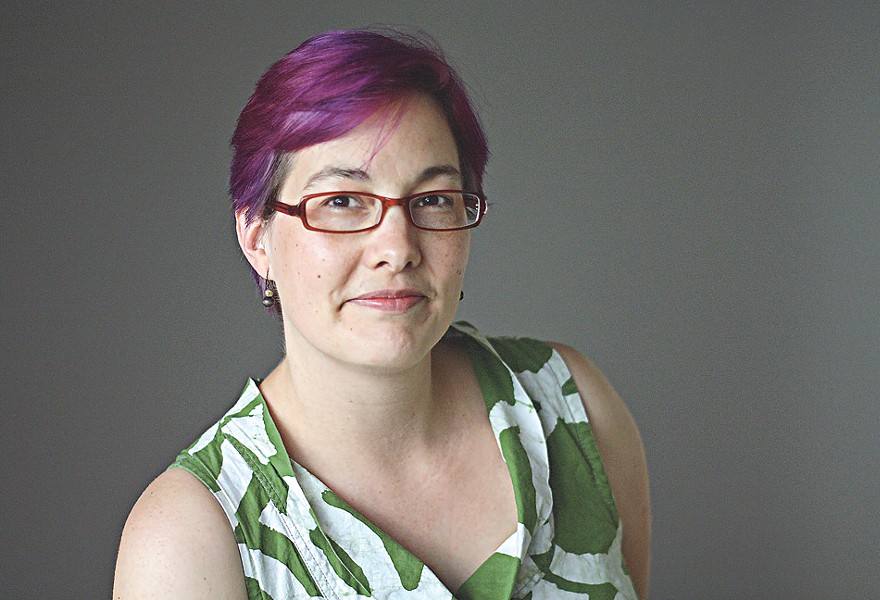Early on in Kory Stamper's new book, "Word By Word: The Secret Life of Dictionaries," the author and lexicographer describes her life's work and that of her fellow editors at Merriam-Webster in a way that is somehow both mundane and fascinating. It reads like the beginning of some strange, bookish version of a "Law & Order" episode:
"In that unassuming brick building in Springfield, there are a couple dozen people who spend their workweek doing nothing but making dictionaries — sifting the language, categorizing it, describing it, alphabetizing it. They are word nerds who spend the better part of their lives writing and editing dictionary definitions, thinking deeply about adverbs, and slowly, inexorably going blind. They are lexicographers."
You'd almost expect the line that follows to read: "These are their stories." With energetic zeal, refreshing humor, and healthy irreverence, Stamper draws back the curtain to reveal the entertaining and tedious, mind-numbing and stimulating work that is sculpting the English language.
Stamper will speak at The Writers Forum Series at The College at Brockport on Wednesday, November 29, at 8 p.m. In a recent email interview, Stamper talked with CITY about her reasons for writing a book about lexicography, why lexicographers love the Internet, and why she sees the English language as a whore. An edited version of the interview follows.
CITY: How does someone get into lexicography in the first place?
Kory Stamper: It's not the most common career path, I will admit. Most of us got into it by dint of being in the right place at the right time — the only requirements for the job are that you be a native English speaker, that you have a college degree in anything, and that you have a good grasp of the English language.
Why write a behind-the-scenes look at how dictionaries are created now?
Over the last few years, lexicographers have seen a renewed interest in language and specifically how words are assigned meanings. Who gets to give words a particular meaning? How quickly do words change meaning? Are you going to change the meaning of "fact" to allow for "alternative fact," or the meaning of "fake" to allow for mainstream media to be "fake news"?
People look to dictionaries to be objective, but they really have no idea how dictionaries are made, or even how the language itself shifts around naturally.
In the book's preface, you refer to humanity as "linguistic hoarders." As the landscape of language continues to shift amidst the ebb and flow of colloquialism and social media, do we value words differently than we did 20 years ago?
I don't know that I'd say that — I mean, quibbling over the meaning of the word "is" led to the impeachment of a sitting president about 20 years ago. But I do think that we're more aware of different types of language, thanks to social media.
The language used on social media is a weird and exciting intermediary between public writing and private communication, which means that people are a little looser on social media than they would be in a printed format. So we get to see all these specimens of English that we wouldn't see otherwise. Some people respond with panic — "OMG, the Internet is killing English" — but lexicographers and linguists love it. You get to see the natural progression and track of language in real-time.
You also call English "this wild, vibrant whore of a language." What do you mean by that exactly? Are there languages you've encountered that are comparatively more chaste?
English has always stolen vocabulary or syntax or weird little phrases from other languages — even as far back as the early Middle Ages. People often think of English as somehow pure, but really, it's just as happy to steal words from any and all languages that it comes in contact with and line the linguistic nest with them.
There are languages that are what linguists call "more conservative" — they just don't borrow words from other languages as much. Icelandic is definitely one, and Finnish is another. In most European languages, the word for "telephone" is some variation on "telephone." In Finnish, it's "puhelin" (which means "that which is talked on"). That's so great. Suomi forever.
There are some really interesting anecdotes in this book, including the fact that the use of gender-neutral pronouns is not a recent phenomenon, but a practice prevalent in the 14th century. What is the biggest lesson you learned from studying the history of lexicography? Is there one big takeaway?
You're never going to "fix" English, and you probably shouldn't try. So many people for hundreds of years have tried to clean English up and make it logical, and if their changes succeed at all, the only thing they're doing is mucking it up. English is wild and messy and complicated, just like its speakers.
Kory Stamper's blog "Harmless Drudgery" can be found at korystamper.wordpress.com.
